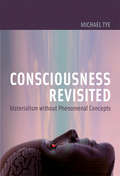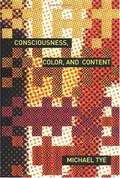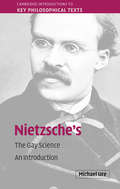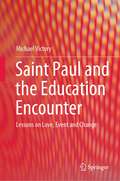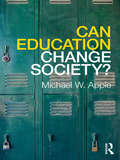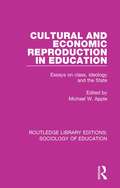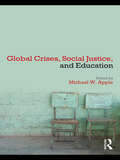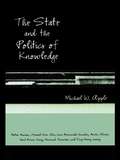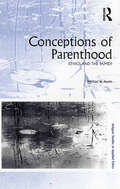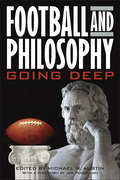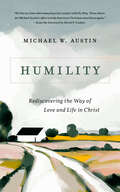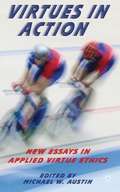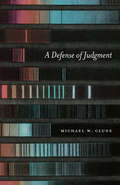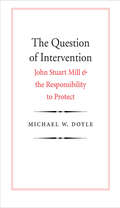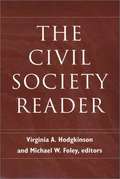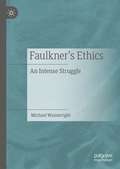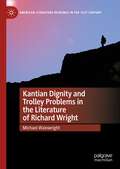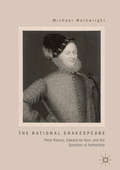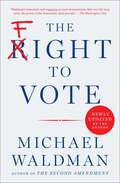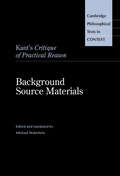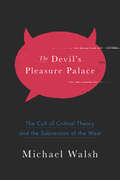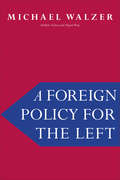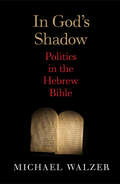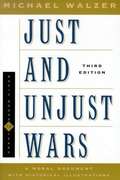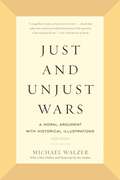- Table View
- List View
Consciousness Revisited: Materialism without Phenomenal Concepts (Representation and Mind series)
by Michael TyeFour major puzzles of consciousness philosophical materialism must confront after rejecting the phenomenal concept strategy.We are material beings in a material world, but we are also beings who have experiences and feelings. How can these subjective states be just a matter of matter? To defend materialism, philosophical materialists have formulated what is sometimes called "the phenomenal-concept strategy," which holds that we possess a range of special concepts for classifying the subjective aspects of our experiences. In Consciousness Revisited, the philosopher Michael Tye, until now a proponent of the the phenomenal-concept strategy, argues that the strategy is mistaken.A rejection of phenomenal concepts leaves the materialist with the task of finding some other strategy for defending materialism. Tye points to four major puzzles of consciousness that arise: How is it possible for Mary, in the famous thought experiment, to make a discovery when she leaves her black-and-white room? In what does the explanatory gap consist and how can it be bridged? How can the hard problem of consciousness be solved? How are zombies possible? Tye presents solutions to these puzzles—solutions that relieve the pressure on the materialist created by the failure of the phenomenal-concept strategy. In doing so, he discusses and makes new proposals on a wide range of issues, including the nature of perceptual content, the conditions necessary for consciousness of a given object, the proper understanding of change blindness, the nature of phenomenal character and our awareness of it, whether we have privileged access to our own experiences, and, if we do, in what such access consists.
Consciousness, Color, and Content
by Michael TyeExperiences and feelings are inherently conscious states. There is something it is like to feel pain, to have an itch, to experience bright red. Philosophers call this sort of consciousness "phenomenal consciousness."
Nietzsche's The Gay Science: An Introduction (Cambridge Introductions to Key Philosophical Texts)
by Michael UreNietzsche's The Gay Science (1882/1887) is a deeply personal book, yet also an important work of philosophy. Nietzsche conceives it as a philosophical autobiography, a record of his own self-transformation. In beautifully composed aphorisms he communicates his central experience of overcoming pessimism and recovering the capacity to affirm joyfully the tragedy of life. On the basis of his experiments in living, Nietzsche articulates his most famous philosophical concepts and images: the death of God, the exercise of eternal recurrence, and the ideal of self-fashioning. This book explains the ancient and modern philosophical contexts that shape Nietzsche's central concern with the affirmation of life. It surveys Nietzsche's philosophy as a whole, explains the pivotal place of The Gay Science as the source of his ideal of tragic joy, and shows how he revives an ancient conception of philosophy as a way of life and the philosopher as physician.
Saint Paul and the Education Encounter: Lessons on Love, Event and Change
by Michael VictoryThis book connects the Biblical Paul’s work as an educator with the revival of interest in Paul’s impact on contemporary social and cultural experience, sometimes referred to as ‘Paul’s new moment’. It presents Paul's letters as being the testament of an educator who brought a radical emancipatory approach to the communities with whom he lived and worked. The book draws on history, philosophy, New Testament studies, and social theory to present the case for Paul as the initiator of a pedagogy of the event. This book explores the concept of a pedagogy of the event, and provides a case study of success in its implementation.
Can Education Change Society?
by Michael W. AppleDespite the vast differences between the Right and the Left over the role of education in the production of inequality one common element both sides share is a sense that education can and should do something about society, to either restore what is being lost or radically alter what is there now. The question was perhaps put most succinctly by the radical educator George Counts in 1932 when he asked "Dare the School Build a New Social Order?", challenging entire generations of educators to participate in, actually to lead, the reconstruction of society. Over 70 years later, celebrated educator, author and activist Michael Apple revisits Counts’ now iconic works, compares them to the equally powerful voices of minoritized people, and again asks the seemingly simply question of whether education truly has the power to change society. In this groundbreaking work, Apple pushes educators toward a more substantial understanding of what schools do and what we can do to challenge the relations of dominance and subordination in the larger society. This touchstone volume is both provocative and honest about the ideological and economic conditions that groups in society are facing and is certain to become another classic in the canon of Apple’s work and the literature on education more generally.
Cultural and Economic Reproduction in Education: Essays on Class, Ideology and the State (Routledge Library Editions: Sociology of Education #53)
by Michael W. AppleFirst published in 1982, this collection of essays provides an analysis of education’s contradictory role in social reproduction. It looks at the complex relations between the economic, political and cultural spheres of society, both historically and at the time of publication, and hones the wider range of debate in on education. This volume will be of interest to those studying sociology and equality in education.
Global Crises, Social Justice, and Education
by Michael W. AppleEducation cannot be understood today without recognizing that nearly all educational policies and practices are strongly influenced by an increasingly integrated international economy. Reforms in one country have significant effects in others, just as immigration and population tides from one area to another have tremendous impacts on what counts as official knowledge and responsive and effective education. But what are the realities of these global crises that so many people are experiencing and how do their effects on education resonate throughout the world? Global Crises, Social Justice, and Education looks into the ways we understand globalization and education by getting specific about what committed educators can do to counter the relations of dominance and subordination around the world. From some of the world’s leading critical educators and activists, this timely new collection provides thorough and detailed analyses of four specific centers of global crisis: the United States, Japan, Israel/Palestine, and Mexico. Each chapter engages in a powerful and critical analysis of what exactly is occurring in these regions and counters with an equally compelling critical portrayal of the educational work being done to interrupt global dominance and subordination. Without settling for vague ideas or romantic slogans of hope, Global Crises, Social Justice, and Education offers real, concrete examples and strategies that will contribute to ongoing movements and counter-hegemonic struggles already active in education today.
The State and the Politics of Knowledge
by Michael W. AppleThe State and the Politics of Knowledge extends the insightful arguments Michael Apple provided in Educating the "Right" Way in new and truly international directions. Arguing that schooling is, by definition, political, Apple and his co-authors move beyond a critical analysis to describe numerous ways of interrupting dominance and creating truly democratic and realistic alternatives to the ways markets, standards, testing, and a limited vision of religion are now being pressed into schools.
Conceptions of Parenthood: Ethics and The Family (Ashgate Studies In Applied Ethics Ser.)
by Michael W. AustinOur parents often have a significant impact on the content of our beliefs, the values we hold, and the goals we pursue and becoming a parent can also have a similar impact on our lives. In Conceptions of Parenthood Michael Austin provides a rigorous and accessible philosophical analysis of the numerous and distinct conceptions of parenthood. Issues considered are the nature and justification of parental rights, the sources of parental obligations, the value of autonomy, and the moral obligations and tensions present within interpersonal relationships. Austin rejects the 'proprietarian', 'best interests of the child', and 'biological' conceptions of parenthood as failing to generate parental rights and obligations but considers more sympathetically the 'custodial relationship', 'consent', and 'causal' conceptions of parenthood and ultimately defends a 'stewardship' conception. Finally Austin explores the 'stewardship' view for practical and moral questions related to family life and social policy regarding the family, such as the education of children, the religious upbringing of children and state licensing of parents.
Football and Philosophy: Going Deep (The Philosophy of Popular Culture)
by Michael W. Austin&“Vince Lombardi—who relished his undergraduate studies in philosophy—would have loved this book.&” —Booklist Football and Philosophy: Going Deep investigates many of the issues surrounding the nation&’s biggest sport. From a review of the flaws of the Bowl Championship Series, to a study of the violence inherent in the game, to an examination of Vince Lombardi&’s views on winning, to the problems created by the development of instant replay, the essays in this collection tackle the moral and philosophical principles behind gridiron competition. The result is an insightful, humorous, and original book that will engage all fans of the game. &“Insightful and informative, as well as provocative and entertaining.&” —Charles Taliaferro, author of Consciousness and the Mind of God
Humility: Rediscovering the Way of Love and Life in Christ
by Michael W. AustinAmid culture wars and church division, Michael W. Austin calls us back to the authentic Way—following Christ in humility and love. American Christians have lost the Way. We chase power and comfort and coat our self-righteousness in a Christian veneer. We comfort ourselves that we follow the rules and go to church, so life will work out for us. But we have forgotten what it means to truly follow Christ. Michael Austin brings us back to basics of the Christian life: humility and love. Drawing on Philippians and 1 Corinthians, Austin reminds us how Jesus, in love, poured himself out for others. This other-centeredness stands contrary to vainglorious affirmation in our lives, online and off—and it is the key to healing the deep divisions in our communities. Austin guides the reader through spiritual disciplines to aid in the formation of this virtue, from praying the Psalms to building healthy communities. For Christians seeking transformative union with God, in their souls and society, Humility is the ideal companion.
Virtues in Action
by Michael W. AustinIn recent decades, many philosophers have considered the strengths and weaknesses of a virtue-centered approach to moral theory. Much less attention has been given to how such an approach bears on issues in applied ethics. The essays in this volume apply a virtue-centered perspective to a variety of contemporary moral issues, and in so doing offer a fresh and illuminating perspective. Some of the essays focus on a particular virtue and its application to one or more realms of applied ethics, such as temperance and sex or humility and environmental ethics. Other chapters focus on an issue in applied ethics and bring several virtues into a discussion of that issue or realm of life, such as sport, education, and business. Finally, several of the chapters engage relevant psychological research as well as current neuroscience, which enhances the strength of the philosophical arguments.
A Defense of Judgment
by Michael W. CluneTeachers of literature make judgments about value. They tell their students which works are powerful, beautiful, surprising, strange, or insightful—and thus, which are more worthy of time and attention than others. Yet the field of literary studies has largely disavowed judgments of artistic value on the grounds that they are inevitably rooted in prejudice or entangled in problems of social status. For several decades now, professors have called their work value-neutral, simply a means for students to gain cultural, political, or historical knowledge. ?Michael W. Clune’s provocative book challenges these objections to judgment and offers a positive account of literary studies as an institution of aesthetic education. It is impossible, Clune argues, to separate judgments about literary value from the practices of interpretation and analysis that constitute any viable model of literary expertise. Clune envisions a progressive politics freed from the strictures of dogmatic equality and enlivened by education in aesthetic judgment, transcending consumer culture and market preferences. Drawing on psychological and philosophical theories of knowledge and perception, Clune advocates for the cultivation of what John Keats called “negative capability,” the capacity to place existing criteria in doubt and to discover new concepts and new values in artworks. Moving from theory to practice, Clune takes up works by Keats, Emily Dickinson, Gwendolyn Brooks, Samuel Beckett, and Thomas Bernhard, showing how close reading—the profession’s traditional key skill—harnesses judgment to open new modes of perception.
The Question of Intervention
by Michael W. DoyleThe question of when or if a nation should intervene in another country's affairs is one of the most important concerns in today's volatile world. Taking John Stuart Mill's famous 1859 essay "A Few Words on Non-Intervention" as his starting point, international relations scholar Michael W. Doyle addresses the thorny issue of when a state's sovereignty should be respected and when it should be overridden or disregarded by other states in the name of humanitarian protection, national self-determination, or national security. In this time of complex social and political interplay and increasingly sophisticated and deadly weaponry, Doyle reinvigorates Mill's principles for a new era while assessing the new United Nations doctrine of responsibility to protect. In the twenty-first century, intervention can take many forms: military and economic, unilateral and multilateral. Doyle's thought-provoking argument examines essential moral and legal questions underlying significant American foreign policy dilemmas of recent years, including Libya, Iraq, and Afghanistan.
The Civil Society Reader
by Virginia A. Hodgkinson Michael W. FoleyVirginia Hodgkinson and Michael Foley have assembled a definitive collection of 24 readings from the writings of thinkers who have shaped the civil society tradition in Western political thought through the ages. Their clear, intelligent introduction establishes a framework for understanding the complex and perennial debate over conditions of citizenship and the character of the good society. The text moves from the origins of the debate, a consideration of Aristotle's vision of political order, the polis, through the "civic republicanism" of Machiavelli and his English and American followers. It also discusses Hobbes's and Montesquieu's conceptions of natural law and the social contract, Immanuel Kant and Adam Ferguson and the emergence of the modern notion of civil society in the late 18th century, and the thoughts and theories of Hegel, Marx, and Gramsci. Contemporary discussion of civil society in the US started with Berger, Newhaus, and others who addressed the role of intermediary institutions and the political process. In the 1980s, especially as the Cold War ended, writing on civil society exploded. The anthology tracks the key works that have influenced public dialogue in this era. Chapters by Walzer, Barber, Putnam, Almond and Verba, Shils, and others describe the role of association in civil society and its role in democratic governance. As the concept of "civil society" grows ever more prominent in academic and public considerations of politics and political organization, citizen participation, political alienation, voluntary organizations, privatization, government deregulation, and "faith-based" charities, Civil Society: A Reader is the essential historical and theoretical text.
Faulkner’s Ethics: An Intense Struggle
by Michael WainwrightThis book offers the first comprehensive investigation of ethics in the canon of William Faulkner. As the fundamental framework for its analysis of Faulkner’s fiction, this study draws on The Methods of Ethics, the magnum opus of the utilitarian philosopher Henry Sidgwick. While Faulkner’s Ethics does not claim that Faulkner read Sidgwick’s work, this book traces Faulkner’s moral sensitivity. It argues that Faulkner’s language is a moral medium that captures the ways in which people negotiate the ethical demands that life places on them. Tracing the contours of this evolving medium across six of the author’s major novels, it explores the basic precepts set out in The Methods of Ethics with the application of more recent contributions to moral philosophy, especially those of Jacques Derrida and Derek Parfit.
Kantian Dignity and Trolley Problems in the Literature of Richard Wright (American Literature Readings in the 21st Century)
by Michael WainwrightThis book examines the literature of African-American author Richard Wright and the philosophy of Immanuel Kant, arguing that Wright was not only the foremost proponent of minoritarian protest literature, but also a groundbreaking minoritarian exponent of philosophical literature. In presenting this argument, the volume defends trolley problems from the criticism that some philosophers level against them by promoting their use as an interpretive tool for literary scholars. Starting with Martha C. Nussbaum’s interventions in literary theory concerning Henry James and perceptive equilibrium, this book draws on the philosophical thoughts of her contemporaries—Philippa Foot, John Rawls, Judith Jarvis Thomson, and Derek Parfit—to analyze Uncle Tom’s Children, especially “Down by the Riverside,” alongside other works by Wright. This approach emphasizes Wright’s recognition of the importance and integrity of Kant’s concept of dignity.
The Rational Shakespeare: Peter Ramus, Edward de Vere, and the Question of Authorship
by Michael WainwrightThe Rational Shakespeare: Peter Ramus, Edward de Vere, and the Question of Authorship examines William Shakespeare’s rationality from a Ramist perspective, linking that examination to the leading intellectuals of late humanism, and extending those links to the life of Edward de Vere, Seventeenth Earl of Oxford. The application to Shakespeare’s plays and sonnets of a game-theoretic hermeneutic, an interpretive approach that Ramism suggests but ultimately evades, strengthens these connections in further supporting the Oxfordian answer to the question of Shakespearean authorship.
The Fight to Vote
by Michael WaldmanPraised by the late John Lewis, this is the seminal book about the long and ongoing struggle to win voting rights for all citizens by the president of The Brennan Center, the leading organization on voter rights and election security, now newly revised to describe today&’s intense fights over voting.As Rep. Lewis said, and recent events in state legislatures across the country demonstrate, the struggle for the right to vote is not over. In this &“important and powerful&” (Linda Greenhouse, former New York Times Supreme Court correspondent) book Michael Waldman describes the long struggle to extend the right to vote to all Americans. From the writing of the Constitution, and at every step along the way, as disenfranchised Americans sought this right, others have fought to stop them. Waldman traces this history from the Founders&’ debates to today&’s many restrictions: gerrymandering; voter ID laws; the flood of dark money released by conservative organizations; and the concerted effort in many state legislatures after the 2020 election to enact new limitations on voting. Despite the pandemic, the 2020 election had the highest turnout since 1900. In this updated edition, Waldman describes the nationwide effort that made this possible. He offers new insights into how Donald Trump&’s false claims of fraud—&“the Big Lie&”—led to the January 6 insurrection and the fights over voting laws that followed one of the most dramatic chapters in the story of American democracy. As Waldman shows, this fight, sometimes vicious, has always been at the center of American politics because it determines the outcome of the struggle for power. The Fight to Vote is &“an engaging, concise history…offering many useful reforms that advocates on both sides of the aisle should consider&” (The Wall Street Journal).
Kant's Critique of Practical Reason: Background Source Materials (Cambridge Philosophical Texts in Context)
by Michael WalschotsKant did not initially intend to write the Critique of Practical Reason, let alone three Critiques. It was primarily the reactions to the Critique of Pure Reason and the Groundwork of the Metaphysics of Morals that encouraged Kant to develop his moral philosophy in the second Critique. This volume presents both new and first-time English translations of texts written by Kant's predecessors and contemporaries that he read and responded to in the Critique of Practical Reason. It also includes several subsequent reactions to the second Critique. Together, the translations in this volume present the Critique of Practical Reason in its full historical context, offering scholars and students new insight into Kant's moral philosophy. The detailed editorial material appended to each of the eleven chapters helps introduce readers to the life and works of the authors, outlines the texts translated, and points to relevant passages across Kant's works.
The Devil's Pleasure Palace
by Michael WalshIn the aftermath of World War II, America stood alone as the world's premier military power. Yet its martial confidence contrasted vividly with its sense of cultural inferiority. Still looking to a defeated and dispirited Europe for intellectual and artistic guidance, burgeoning trans-national elite in New York and Washington embraced not only the war's refugees, but many of their ideas as well, and nothing has proven more pernicious than those of the Frankfurt School and its reactionary philosophy of "critical theory." At once overly intellectualized and emotionally juvenile, Critical Theory - like Pandora's Box - released a horde of demons into the American psyche. When everything could be questioned, nothing could be real, and the muscular, confident empiricism that had just won the war gave way, in less than a generation, to a central-European nihilism celebrated on college campuses across the United States. Seizing the high ground of academe and the arts, the New Nihilists set about dissolving the bedrock of the country, from patriotism to marriage to the family to military service; they have sown (as Cardinal Bergoglio - now Pope Francis - once wrote of the Devil) "destruction, division, hatred, and calumny" - and all disguised as the search for truth.In The Devil's Pleasure Palace we will look at the ways Critical Theory took root in America and, once established and gestated, has affected nearly every aspect of American life and society - and what can be done to stop it.
A Foreign Policy for the Left
by Michael WalzerSomething that has been needed for decades: a leftist foreign policy with a clear moral basis Foreign policy, for leftists, used to be relatively simple. They were for the breakdown of capitalism and its replacement with a centrally planned economy. They were for the workers against the moneyed interests and for colonized peoples against imperial (Western) powers. But these easy substitutes for thought are becoming increasingly difficult. Neo-liberal capitalism is triumphant, and the workers’ movement is in radical decline. National liberation movements have produced new oppressions. A reflexive anti-imperialist politics can turn leftists into apologists for morally abhorrent groups. In Michael Walzer’s view, the left can no longer (in fact, could never) take automatic positions but must proceed from clearly articulated moral principles. In this book, adapted from essays published in Dissent, Walzer asks how leftists should think about the international scene—about humanitarian intervention and world government, about global inequality and religious extremism—in light of a coherent set of underlying political values.
In God's Shadow
by Michael WalzerIn this eagerly awaited book, political theorist Michael Walzer reports his findings after decades of thinking about the politics of the Hebrew Bible. Attentive to nuance while engagingly straightforward, Walzer examines the laws, the histories, the prophecies, and the wisdom of the ancient biblical writers and discusses their views on such central political questions as justice, hierarchy, war, the authority of kings and priests, and the experience of exile. Because there are many biblical writers with differing views, pluralism is a central feature of biblical politics. Yet pluralism, Walzer observes, is never explicitly defended in the Bible; indeed, it couldn’t be defended since God’s word had to be as singular as God himself. Yet different political regimes are described in the biblical texts, and there are conflicting political arguments—and also a recurrent anti-political argument: if you have faith in God, you have no need for strong institutions, prudent leaders, or reformist policies. At the same time, however, in the books of law and prophecy, the people of Israel are called upon to overcome oppression and “let justice well up like water, righteousness like an unfailing stream. ”
Just and Unjust Wars: A Moral Argument With Historical Illustrations, 3rd Ed.
by Michael WalzerThis classic work examines the issues surrounding military theory, war crimes, and the spoils of war from the Athenian attack on Melos to the My Lai massacre. A revised and updated classic treatment of the morality of war written by one of our country's leading philosophers. Just and Unjust Wars examines a variety of conflicts in order to understand exactly why, according to Walzer, "the argument about war and justice is still a political and moral necessity." Walzer's classic work draws on historical illustrations that range all the way from the Athenian attack on Melos to this morning's headlines, and uses the testimony of participants-decision makers and victims alike-to examine the moral issues of warfare.
Just and Unjust Wars: A Moral Argument with Historical Illustrations
by Michael WalzerFrom the Athenian attack on Melos to the My Lai Massacre, from the wars in the Balkans through the first war in Iraq, Michael Walzer examines the moral issues surrounding military theory, war crimes, and the spoils of war. He studies a variety of conflicts over the course of history, as well as the testimony of those who have been most directly involved--participants, decision makers, and victims. In his introduction to this new edition, Walzer specifically addresses the moral issues surrounding the war in and occupation of Iraq, reminding us once again that "the argument about war and justice is still a political and moral necessity."
